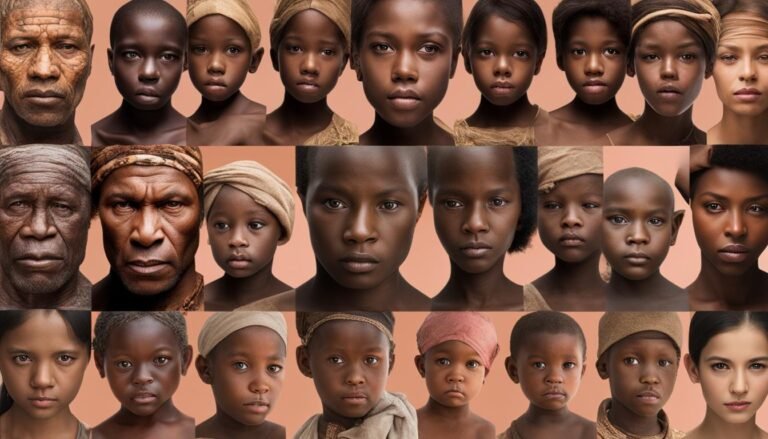How does skin color affect mental health?
Have you ever wondered how skin color can impact our mental well-being? It’s a topic that often goes overlooked, but recent research has shed light on the profound effects that skin color can have on our psychological state. From racial identity to discrimination, the complexities surrounding skin color and mental health are vast.
Studies have revealed that discrimination is associated with worse self-rated mental health and serious psychological distress among older African Americans. However, it goes even deeper than that. Darker-skinned individuals tend to experience stronger negative psychological effects associated with discrimination compared to their lighter-skinned counterparts. Skin tone has been found to play a significant role in the association between discrimination and mental health outcomes.
So, how does skin color truly impact mental health? And what are the underlying factors that contribute to this relationship? Let’s delve deeper into the complexities and nuances of this important topic.
Key Takeaways:
- Skin color is a significant factor in the relationship between discrimination and mental health outcomes.
- Darker-skinned individuals tend to experience stronger negative psychological effects associated with discrimination.
- Discrimination and its impact on mental health can vary based on gender and other factors.
- Understanding the complexities of skin color and mental health is crucial for addressing disparities and promoting well-being.
- Further research is needed to fully comprehend the nuances and specific needs of different subgroups within the Black community.
The Impact of Skin Color on Health Disparities
Research has consistently shown that darker complexion among African Americans is linked to disadvantages in socioeconomic position, physical health, mortality, and exposure to discrimination and unfair treatment.
Colorism, defined as preferential treatment based on skin color, plays a significant role in perpetuating these disparities. In terms of mental health, dark-skinned African Americans tend to report higher psychological distress and poorer self-rated mental health compared to their lighter-skinned counterparts.
This may be due to the embodiment of negative stereotypes applied to darker-skinned individuals and the differential treatment they receive. Skin tone is a contextualizing factor that influences the experiences and life chances of African Americans, and there may be generational differences in how skin tone is perceived among this population.
“The impact of skin color on health disparities is significant. Dark-skinned African Americans face multiple challenges in areas such as socioeconomic status and physical health. These disparities can be attributed to colorism and the associated discrimination that darker-skinned individuals often experience. It is crucial to recognize the role of skin tone in shaping health outcomes and work towards addressing these disparities.”
The Relationship Between Skin Color and Mental Health Outcomes
The relationship between skin color and mental health outcomes can be understood through the stress process framework, which posits that stressors and life adversities can significantly impact an individual’s mental health. Chronic stressors, including discrimination, are more prevalent among African Americans, particularly those with darker skin tones.
Research has shown that discrimination is associated with various mental health outcomes, such as depressive symptoms, psychological distress, hopelessness, and psychiatric vulnerabilities. Studies have consistently highlighted the negative psychological effects of discrimination on individuals with darker complexions compared to those with lighter complexions.
In some cases, the research suggests that lighter complexions may be associated with less discrimination from out-groups compared to darker complexions. However, the findings on this association are mixed and not conclusive.
Furthermore, the relationship between skin tone and mental health outcomes has been explored from a gender perspective. Gender differences in the impact of skin color on mental health outcomes have been identified, but further research is needed to fully understand and explain these differences.
Understanding the Stress Process Framework
The stress process framework provides a comprehensive understanding of how chronic stressors, such as discrimination, can lead to mental health disparities among individuals with different skin tones. This framework highlights the role of stressors in triggering psychological distress, mood disorders, and other mental health outcomes.
“Chronic stressors, including discrimination, are more prevalent among African Americans, particularly those with darker skin tones.”
Mental Health Outcomes Associated with Skin Color
The impact of skin color on mental health outcomes is evident in the experience of various mood disorders and psychological distress. Darker-skinned individuals tend to report higher levels of psychological distress and poorer self-rated mental health compared to their lighter-skinned counterparts.
Table: Skin Color and Mental Health Outcomes
| Skin Color | Mental Health Outcomes |
|---|---|
| Dark | Higher levels of psychological distress and poorer self-rated mental health |
| Light | Less out-group discrimination (mixed findings) |

The relationship between skin color and mental health outcomes highlights the need to address the impact of discrimination and chronic stressors on individuals with darker skin tones. It also emphasizes the importance of understanding the complexities and intersections of race, skin color, and mental health in order to implement effective interventions and support for those experiencing disparities in mental health.
Conclusion
The relationship between skin color and mental health is a complex and multifaceted issue, particularly for Black Americans and Caribbean Blacks. Both groups face the detrimental effects of colorism on their mental well-being, but the specific associations between skin tone and mental health outcomes vary.
African Americans with lighter skin tones are particularly vulnerable to poorer mental health outcomes. This may be due to the internalization of negative stereotypes and the psychological impact of discrimination faced by individuals with lighter complexions. On the other hand, Caribbean Blacks exhibit a more nuanced relationship between skin color and mental health. Depending on the specific psychiatric outcome, a linear or curvilinear association may exist.
These findings underline the importance of recognizing the influence of ethnicity and cultural backgrounds in understanding mental health disparities. Black Americans and Caribbean Blacks have distinct experiences, and a one-size-fits-all approach to mental health interventions may not adequately address their unique needs.
In order to better comprehend the nuances of how skin color impacts mental health, further research is needed. It is crucial to explore the specific challenges faced by different subgroups within the Black community and develop tailored interventions that address their distinct requirements. By taking into account the complexities of colorism and ethnic differences, we can work towards promoting better mental health outcomes for all individuals, regardless of their skin color.






